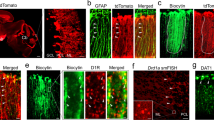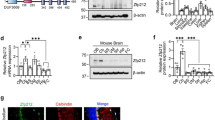Abstract
HIGH affinity benzodiazepine binding sites which are both stereospecific and saturable1–3 have recently been characterised in the mammalian central nervous system (CNS). The good correlations obtained between the binding affinities of a series of benzodiazepines and their potencies as anticonvulsants, anxiolytics and muscle relaxants strongly suggest that these sites may function as pharmacological receptors for the benzodiazepines1,4. Although both the gross anatomical3,5 and subcellular distribution6 of these sites have been described, the cellular localisation of these sites is not known, nor has a direct functional link been established between benzodiazepine binding sites and the neuropharmacological effects of these drugs. We now report that ‘nervous’ mutant mice, which undergo a selective loss of more than 90% of their cerebellar Purkinje cells during maturation7,8, have a marked reduction in the number of cerebellar benzodiazepine receptors. This loss in benzodiazepine receptors seems to be confined to the cerebellum, and is not accompanied by an alteration in the affinity of the receptor for diazepam. These data clearly demonstrate the loss of benzodiazepine receptors in a cell type which has been shown to be both neurochemically9 and electrophysiologically10 sensitive to benzodiazepines, thus providing evidence that benzodiazepine receptors function in the pharmacological actions of these drugs.
This is a preview of subscription content, access via your institution
Access options
Subscribe to this journal
Receive 51 print issues and online access
$199.00 per year
only $3.90 per issue
Buy this article
- Purchase on Springer Link
- Instant access to full article PDF
Prices may be subject to local taxes which are calculated during checkout
Similar content being viewed by others
References
Squires, R. F. & Braestrup, C. Nature 266, 732–734 (1977).
Mohler, H. & Okada, T. Life Sci. 20, 2101–2110 (1977).
Williamson, M. J., Paul, S. M. & Skolnick, P. Nature 275, 551–553 (1978).
Mohler, H. & Okada, T. Science 198, 849–851 (1977).
Braestrup, C., Albrechsten, R. & Squires, R. F. Nature 269, 702–704 (1977).
Bosmann, H. B., Penney, D. P., Case, K. R., DiStefano, P. & Averill, K. FEBS Lett. 87, 199–202 (1978).
Mallet, J., Huchet, M., Pougeois, R. & Changeux, J. P. Brain Res. 103, 291–312 (1976).
Landis, S. C. J. Cell Biol. 57, 782–797 (1973).
Costa, E., Guidotti, A. & Mao, C. C. in Mechanism of Action of Benzodiazepines (eds Costa, E. & Greengard, P.) 113–130 (Raven, New York, 1975).
Haefely, W. et al. in Mechanism of Action of Benzodiazepines (eds Costa, E. & Greengard, P.) 131–151 (Raven, New York 1975).
Paul, S. M. & Skolnick, P. Science 202, 892–894 (1978).
Author information
Authors and Affiliations
Rights and permissions
About this article
Cite this article
SKOLNICK, P., SYAPIN, P., PAUGH, B. et al. Reduction in benzodiazepine receptors associated with Purkinje cell degeneration in ‘nervous’ mutant mice. Nature 277, 397–399 (1979). https://doi.org/10.1038/277397a0
Received:
Accepted:
Issue Date:
DOI: https://doi.org/10.1038/277397a0
This article is cited by
-
[3H]muscimol and [3H]flunitrazepam binding sites in the developing cerebellum of mice treated with methylazoxymethanol at different postnatal ages
Neurochemical Research (1992)
-
Environmentally-induced modification of the benzodiazepine/GABA receptor coupled chloride ionophore
Psychopharmacology (1987)
-
Effect of diazepam on vestibular compensation in squirrel monkeys
Archives of Oto-Rhino-Laryngology (1984)
-
The staircase test in mice: A simple and efficient procedure for primary screening of anxiolytic agents
Psychopharmacology (1984)
-
Glycine receptor alteration in the mutant mouse spastic
Nature (1982)
Comments
By submitting a comment you agree to abide by our Terms and Community Guidelines. If you find something abusive or that does not comply with our terms or guidelines please flag it as inappropriate.



